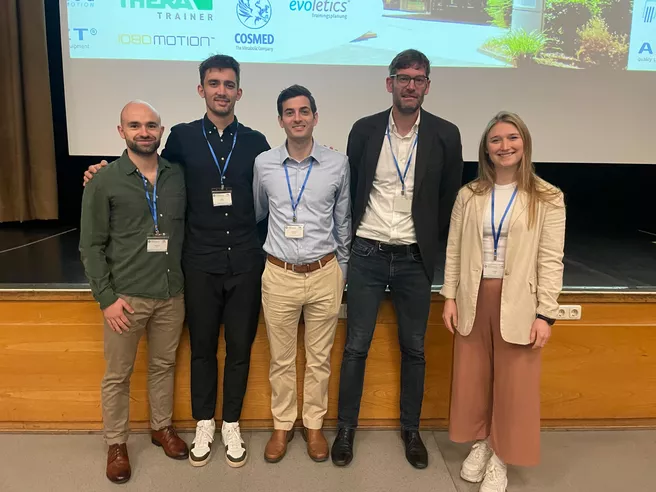From November 9th to 10th, 2023, the GEST:23 conference of the German Association of Sport Science (dvs) section Training sciences took place at the German Sport University Cologne. This year's symposium title was "Optimizing Training in Sports, Exercise, and Health."
The professorship of Exercise, Nutrition, and Health was represented by presentations from Dr. Christoph Höchsmann, Valentin Nusser, Lucas Thurnherr, and Isabella Uphoff. The session on Exercise and Nutrition was hosted by Prof. Dr. Karsten Köhler.
Dr. Christoph Höchsmann gave insight into two projects: The first one examined the effects of fasted training in the evening on post-exercise food intake. Compared to training in a non-fasted state, food intake on the training day in the fasted group (6 hours fasting; no calorie intake after lunch) was reduced, and there was no significant compensatory increase in calorie intake in the 18 hours following the training session compared to non-fasted training. The second project focused on evaluating the effectiveness of an 8-week weight loss program (exercise program + nutrition plan) offered by Mrs.Sporty ("Kilos-Weg-Camp") and verifying the claim "-8kg in 8 weeks." Participants lost an average of approximately 6 kg, which was significantly less than the advertised 8 kg. However, the weight loss fell within a health-relevant range, and the maintenance of fat-free mass was a strength of the program.
Valentin Nusser presented findings from his study “RED-Season”, examining the relationship between knowledge about carbohydrates and the risk of low energy availability (LEA) and endurance performance indicators in adult amateur triathletes. It was observed that those with a higher score on the knowledge questionnaire had on the one hand a lower risk of LEA and on the other hand were able to significantly increase their endurance performance throughout the training season.
Lucas Thurnherr's presentation focused on assessing the nutritional knowledge of elite athletes with the aim of addressing individual knowledge gaps. The presented study found no differences between women and men, but athletes who had received previous counseling scored significantly better on the knowledge test compared to those who had never sought counseling. This indicates the effectiveness of consultations provided by professionals.
Isabella Uphoff presented a systematic literature review examining the effects of fat-free mass on the resting metabolic rate of athletes from various sports. The results suggested a linear relationship between lean body mass and resting metabolic rate among athletes, regardless of the amount of lean mass. However, there was a plateau in the relationship between the Fat-Free Mass Index (FFMI) and resting metabolic rate, likely due to varying proportions of metabolically active tissues within the lean body mass.
For further information, the entire conference program can be found here.
